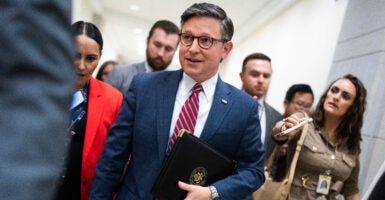House Speaker Mike Johnson has deferred the vote on a bill to fund the government through March.
The temporary government-funding mechanism, called a continuing resolution, would have included the SAVE Act, an election-integrity measure meant to prevent illegal immigrants from voting in federal elections.
Johnson has pulled the bill until next week in hopes of building “consensus” around his plan to avoid a government shutdown and force Democrats to vote against protecting American elections from illegal immigrant votes.
“We are going to continue to work on this. The whip is going to do the hard work to build consensus and work on the weekend on that,” Johnson claimed. The speaker added the Republican conference will have more “family conversations” about it.
The reason Johnson was forced to pull the bill was because of a growing number of GOP holdouts. He could only have afforded four GOP defections in the vote, originally scheduled for Wednesday afternoon, given that Rep. Joe Wilson, R-S.C., was hospitalized last night after collapsing at an event.
At least six Republicans had come out against the continuing resolution. Rep. Mike Rogers, R.-Ala., was one of the first Republicans to announce he’d be voting against the speaker’s plan. The hawkish chairman of the House Armed Services Committee—known for nearly assaulting Rep. Matt Gaetz, R-Fla., during the speakership fight—said he cannot vote for the continuing resolution because it would hold defense expenditures at current levels for the next six months.
“It’s terrible for defense,” Rogers claimed.
Another member of the Armed Services Committee, Rep. Cory Mills, R-Fla., currently opposes the continuing resolution. It “would weaken our defense capabilities and the readiness of our military, just as global threats are rapidly evolving,” the Florida representative said in a statement. “Six months is a long time in politics, but it’s an eternity in geopolitics, where quick responses are critical to countering foreign adversaries threatening to harm U.S. interests.”
Mills, however, was sure to add that he is “a firm NO on bankrupting the nation and a YES on election integrity.”
Rep. Jim Banks, R-Ind., is also on the Armed Services Committee and came out against Johnson’s continuing resolution. “I’m not going to vote to extend bloated spending for six more months and grow the national debt trillions of dollars more,” said the Indiana congressman, who is now running for Senate.
Fiscal hawks have also came out against the continuing resolution, among them Republican Reps. Matt Rosendale of Montana, Andy Biggs of Arizona, Thomas Massie of Kentucky, and Tim Burchett of Tennessee.
“I’ve continuously voted against [continuing resolutions]. I think it is terrible legislating,” Burchett said. “And the No. 1 threat to this country is fiscal irresponsibility. We are going off a fiscal cliff, and I think that every time we do this, we just kick that can further down the road.”
Taken together, their objections have sent Johnson back to the drawing board. The speaker has tasked House Majority Whip Tom Emmer, R-Minn., “to do the hard work and build consensus.”
“We’re going to work through the weekend on that. And I want any member of Congress in either party to explain to the American people why we should not ensure that only U.S. citizens are voting in U.S. elections,” the speaker said. “We’re going to work on that issue around the clock because we have an obligation to the people to do it. And that’s what the fight is. That’s what’s important.”




























